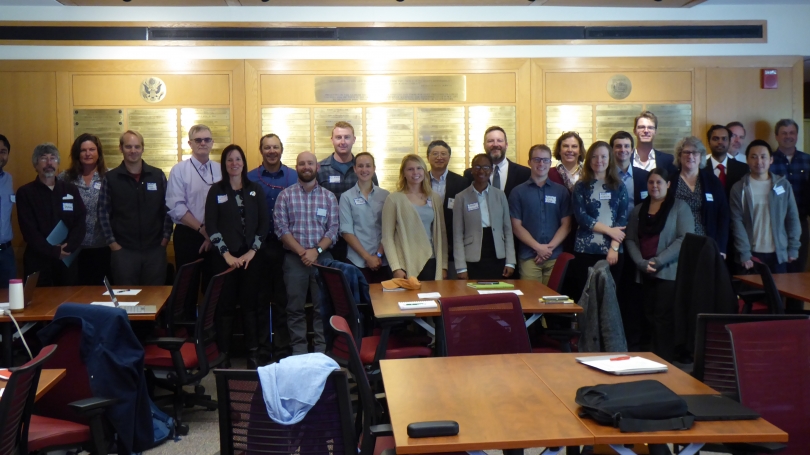
- About
- Education
- Research
- Engagement & Collaboration
- News & Events
Back to Top Nav
Back to Top Nav
Back to Top Nav
Back to Top Nav
On Wednesday, October 9, Dartmouth welcomed partners from the Army Corps of Engineers' Cold Regions Research and Engineering Laboratory (CRREL) to campus kick off of a new collaborative research project, "Resilient Energy System Solutions for Extremely Cold Regions."
The project, for which Professor Elizabeth Wilson, director of the Arthur L. Irving Institute for Energy and Society, is principal investigator, comprises three component research projects. The projects are led by Thayer School of Engineering professors Amro Farid (with research team Prabhat Hegde, Steffi Muhanji, Wester Schoonenberg, and Dakota Thompson); Jifeng Liu (with research team Professor Ian Baker and Associate Professor Ulrike Wegst); and Weiyang Li (with research team members Assistant Professor of Chemistry Katherine A. Mirica and Professor of Engineering Ian Baker). Research teams will assess energy systems in Arctic military installations to optimize energy services, delivery, storage, and mobility. The project itself was made possible by U.S. Sen. Jeanne Shaheen (D-N.H.), a senior member of the Senate Appropriations and Armed Services Committees, who helped facilitate funding of the work.
The event gave the project leads a chance to introduce their teams and share brief overviews of the work ahead. Caitlin Callaghan, Research General Engineer and Energy Lead for the Engineering Resources Branch, offered an overview of the many resources CRREL experts and facilities can provide to enhance Dartmouth's research capabilities, and project members from the lab used the time to ask questions and get to know their new collaborators and their work.
While the immediate goals of the project are to enhance military operations and installations in the Arctic, the potential applications to civilian life won't be too far off, noted Dr. Stephen Doig, Irving Institute Research Director, in his closing remarks. The systems perspective that Professor Farid described can impact smaller, local electric grid installations. The recapture of waste heat, a key element of Professor Liu's project can translate to improvements in energy efficiency locally. And batteries that function even in extremely cold weather, the focus of Professor Li's work, will be welcome in places like New Hampshire, when winter temperatures can dip well below zero.